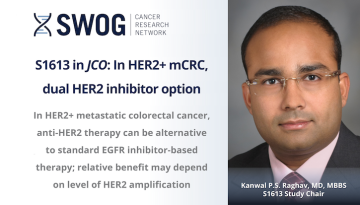The SWOG Commitment to Racial Justice
We are reminded daily of racism in America and the unfair ways it plays out – adversely affecting health care, employment, education, and criminal justice. We are commenting today because racism is an equity issue, particularly with regard to health. Black and brown people are dying in disproportionate rates from COVID-19, as well as other conditions such as heart disease, and are more likely to suffer from chronic pain, diabetes, high blood pressure and depression.
Racism is also present in cancer clinical trials. Our own research tells us this is true. In this new SWOG Cancer Research Network publication by Dr. Joe Unger, we learned that SWOG and other NCTN trials do a better job enrolling black cancer patients into pivotal drug trials compared with industry trials – but we still aren’t enrolling enough black people to ensure they are fully represented. This means black Americans do not have equal access to investigational, and potentially life-saving, cancer drugs. It also means that the drugs we send to the U.S. Food and Drug Administration for approval are not tested on a representative population – so we do not have a complete and accurate understanding of their benefits and side effects.
We must do better.
We are trying hard to work on it. I am proud that my leadership team has a long-standing commitment to studying health disparities and to actively erasing them. Under Dr. Dawn Hershman, our vice chair and NCORP portfolio leader, SWOG has done ground-breaking research into the causes of cancer clinical trial disparities, including investigating racial inequities, and the impacts of, and solutions to, this critical problem. Joe Unger has led important work, with recent publications on insurance status, access to care, reduced trial benefits for low-income patients, and the rural-urban patient divide as health equity issues.
Rick Bangs, our patient advocate chair, is currently at work on the sixth and final training module in the TeamScience@SWOG series. This work is aimed at demonstrating effective ways to include patient advocates across the trial lifecycle, and this final session is focused on best, good, and emerging practices in planning for and attracting diverse patient populations. The training will touch on cultural competence, population forecasting for trials, establishing inclusion and exclusion criteria which support diversity and representativeness, and more. This TeamScience module will be available to you in 2021.
In addition, the entire SWOG patient advocate committee built a new community advocate program that debuted this year. It is aimed specifically at bringing more diverse voices to our trials. A total of 10 new advocates will be hired, and seven are already selected, adding black, Latinx, American Indian, and Asian-Pacific Islander advocates, as well as advocates representing late-stage cancer patients, military veterans, older adults, and adolescent and young adults.
Finally, you remember that the SWOG board of governors made the recruitment and retention committee a permanent research support committee a few years ago. Its sole goal is improving diversity in SWOG membership and leadership and the patients we enroll on our cancer trials. In January, I appointed a dynamic new chair – Dr. Allison Caban-Holt – to lead this committee.
We reached out to Dr. Caban-Holt for this column, and she talked about the need for SWOG to tackle the issue of race in cancer trials the same way we tackle all challenges – as scientists seeking answers to urgent, important questions. We also have to be honest.
“We have to be willing to say that we are not doing enough to understand the racial barriers to clinical trials and remove those barriers,” she said. “Barriers may be financial, or due to trust, language, or other issues. We have to think about them early in the process of developing new research – and not as an after-thought.
“We must believe, and act on the belief, that recruitment of different patient populations is not only important in terms of health equity – but that it’s scientifically important. From a research standpoint, we need to bring people of color to the table when we design our trials, right from the start. And that includes bringing scientists and physicians of color to the table. We need more patients of color in cancer trials, however the disparities are also at the researcher and leadership level. We need SWOG leaders and members who are people of color to advance the science and help generate solutions to health inequity, as well.”
In light of our roles as researchers, advocates, and cancer survivors, now is the time for our actions to speak loudly in response to the current racial unrest by increasing diversity and inclusion in SWOG at every level.
While this work is not progressing fast enough, we can begin doing the difficult work of looking at our research, admitting it is not representative, and exploring new ways of working that allow trial access to more diverse populations. Though this work will never be complete, we have begun.
Other Recent Stories



